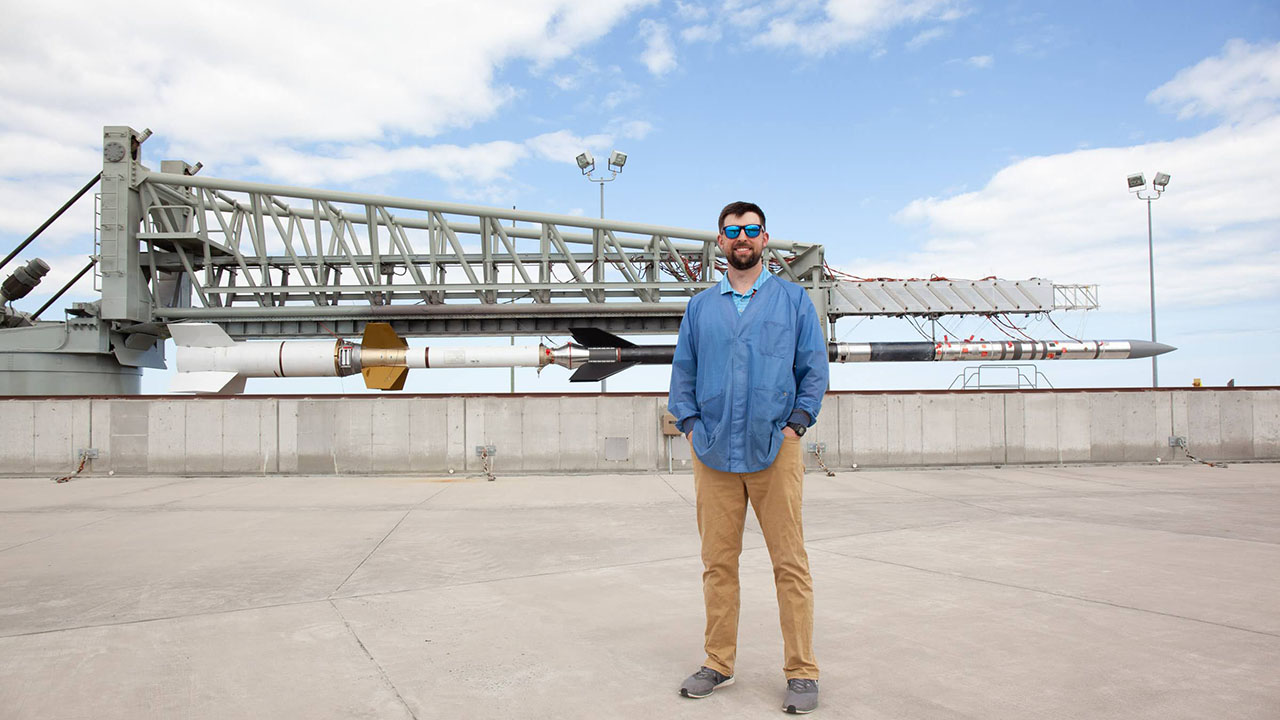Auburn engineers abroad: Balancing risks and reaching goals
Published: Aug 27, 2024 3:00 PM
By Bethany Giles
“I like to describe being a flight test engineer like being a wedding coordinator. You spend months coordinating with multiple personnel, organizations and systems for an event that will last a few minutes at most.”
Benjamin Bauldree is a decade into his career as a flight test engineer and is eager to share lessons he’s learned with current students.
After graduating from Auburn in 2014 with a bachelor’s degree in aerospace engineering, Bauldree began his first position at Eglin Air Force Base in weapons testing. He was selected for the Palace Acquire (PAQ) program, which allowed him to work for a year before returning to Auburn to get his master’s degree in aerospace engineering in 2016.
“One big takeaway for me from Eglin was the culture,” he said. “Being a civil servant in the Air Force in flight test engineering, I got to work with a lot of brilliant people, including test pilots and others who had done flight testing for a long time. I learned about all the work that goes into preparing for and executing a flight test successfully.”
While at Eglin, Bauldree supported various projects all over the world, from New Mexico, California, Hawaii, Guam and the Marshall Islands. When NASA Wallops Flight Facility picked Bauldree up for a project management role within their Range and Mission Management Office, he and his wife, Emlynn, relocated to the Eastern Shore of Maryland. During his tenure with NASA, he led sounding rocket campaigns for NASA science missions from Wallops Flight Facility in Virginia and from Poker Flats Research Range in Alaska. He also led the first set of Department of Defense hypersonic missions from Wallops, as well as supporting the Commercial Resupply Services program with cargo deliveries to the International Space Station.
Today, Bauldree is a senior principal engineer with MTSI in Huntsville, working on an up-and-coming program called the Multi-Service Advanced Capability Hypersonic Test Bed, or MACH-TB, which aims to create an enterprise-wide, easily accessible hypersonic flight test capability for services, agencies and industry stakeholders. In June 2023, acting as flight test director, he led the inaugural launch of the programs first suborbital testbed vehicle in a critical step toward advancing U.S. hypersonic technology.
“My day-to-day life usually involves a lot of meetings with stakeholders, contractors and government agencies doing planning for future flight test missions,” Bauldree said. “In flight test engineering, you need to be a jack-of-all-trades and have the ability to understand the engineering logic that goes into the design and engineering of the systems you’re testing.
“It’s a matter of being able to coordinate lots of groups and individuals from different backgrounds, all to execute a singular event. I ultimately spend a lot of time doing general project and program management, ensuring that we are achieving the engineering pedigree and meeting the larger test objectives on behalf of our government customer.”
Throughout the various projects he has worked on, Bauldree has found that an eagerness to ask questions has served him well.
“If I ever hit a point where I’m not learning something new every day, I’m doing something wrong,” he said. “I always try to surround myself with people who are smarter than me and have more experience than me so I can absorb it. That has helped me throughout my career transitions.”
Bauldree has also worked on projects with partners in Germany and Australia where he’s found that problem solving styles can be vastly different. But everyone has the same end goal.
“Through my engagements in different areas of the world, everyone wants to get it done right and get it done fast,” he said. “It’s all about balancing the risks and failures we can accept while still being able to achieve our objective.”
And, even with lofty goals and expert planning and coordination, things can still go wrong. Bauldree has learned how not to give up.
“You can engineer something to death and spend incredible amounts of money, and still have a failure,” Bauldree said. “How do you overcome that? It takes a combination of a sound methodical approach, along with a little trial and error - that is why testing is so important.”
Within his company and his engagements with Auburn, Bauldree wants to keep students inspired and let them ask questions.
“You might not know exactly what you want to do right now,” Bauldree said. “But the fact that you’re getting exposed to options is what matters. There’s a huge world of possibilities you can jump into. Auburn opens the doors to all those.”
Media Contact: , bcd0048@auburn.edu,

